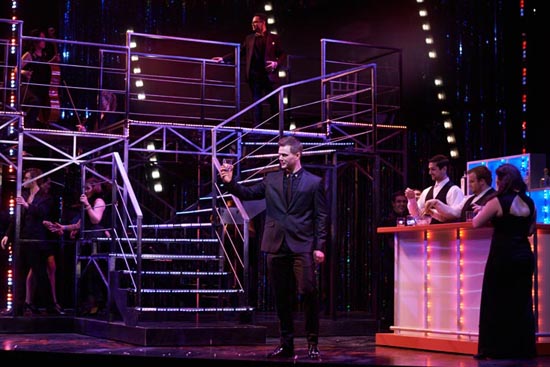Mozart’s Don Giovanni is a wild ride fueled by sex, love, self-delusion, and revenge—set to one of the most achingly gorgeous scores in opera. In a College of Fine Arts production this spring, opera veteran Daniel Pelzig took a fresh visual approach to Giovanni, a timeless tale dominated by a gleeful narcissist whose pathology would mesh easily with today’s culture. Pelzig set the production in contemporary urban Seville instead of the picturesque 17th-century Spanish town of the libretto, and populated it with a witty mix of disco kings, homeys and hipsters, some puffing on joints.
The classic Mozart opera was staged at the BU Theatre under the musical direction of William Lumpkin, artistic director of CFA’s Opera Institute. The production features alternating casts, modern dress, and English supertitles. Described on its website as “an intensive, highly selective two-year performance-based training program for emerging operatic artists,” the Opera Institute accepts more than 12 vocalists each year. The singers, each of whom receives full tuition and a stipend, have the opportunity to participate in two Mainstage productions with a full orchestra such as this performance of Don Giovanni, as well as a Fringe Festival of significant one-act operas and outreach programs.

Strommer’s Don Giovanni regales party guests in the lusty Mozart opera. Photo by Danny Kim
Based on the many legends of Don Juan, a recurring fictional character whose name is synonymous with rakish seducers and libertines, Don Giovanni, which debuted in Prague in 1787, is one of the world’s most performed operas. “It’s a parable, but it’s really about sexual violence, submission, and the complexity of relationships,” says Pelzig, stage director of last spring’s lesser-known Mozart work La Clemenza di Tito. Don Giovanni asks “when is love not love?” says the dancer, choreographer, director, and guest faculty member of the Juilliard School. He has directed new productions of Carmen for Central City Opera, The Bartered Bride for the now-defunct Opera Boston, as well as Tosca and Turandot for the Forth Worth Opera.
Lumpkin describes the lush score, in particular its use of brass, as “visceral to what’s happening on stage,” from a spirited duel to the coming alive of a fearsome statue. Tinged with the supernatural and with comic moments reflecting Mozart’s playfulness, the opera begins with a scuffle following Don Juan’s unwanted advances toward the daughter of a Commendatore and spills into a succession of his obsessive, shameless attempts at further seductions as his enemies seek revenge.

Strommer (from left), Erik Van Heyningen (CFA’15), and Jorgeandrés Camargo (CFA’14) in CFA’s 2014 spring opera production. Photo by Danny Kim
Don Giovanni “is charming, he is fearless, and he’s defiant to the end,” says Pelzig. The role was sung on alternate nights by baritones Isaac Bray (CFA’14) and Nickoli Strommer (CFA’14), who graduated from the Opera Institute in May. Strommer says that his character “takes pleasure in the chase. He doesn’t believe that anything he does is wrong.” For soprano Ruby White (CFA’14), singing the role of Zerlina, the peasant Masetto’s fiancé being wooed by Giovanni, brings her full circle—it was her very first opera role. White loves singing Mozart because his music “offers so many clues to the emotional state of the character.” The opera has long been her favorite. “It’s so perfect dramatically,” she says. “It’s not a piece that’s out of place. It gets better with time.” Bass-baritone Erik Van Heyningen (CFA’15), who sings the part of Masetto, describes Mozart’s score as “the rock music of opera.”
















































Related Stories
Mozart Meets Hip-Hop
In CFA musicians’ video, they get along beautifully
Opera Festival Features Three Rare Gems at BU Theatre
CFA alum to appear with Odyssey Opera
CFA Alum Hailed as a “Postmillennial Mozart”
Opera Song from the Uproar has garnered five-star reviews
Post Your Comment